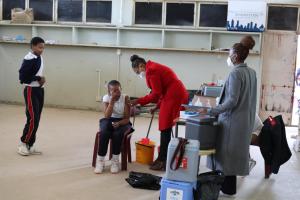Human papillomavirus vaccination in Eswatini: a critical step towards curbing cervical cancer
Mbabane—The Kingdom of Eswatini is making notable strides in its fight against cervical cancer through the successful implementation of a nationwide Human Papillomavirus (HPV) vaccination program. Launched in June 2023, the initiative targets girls aged 9 to 14 years, aiming to reduce the incidence of cervical cancer, a leading cause of cancer-related deaths among women in the country.
HPV is a virus that causes cancers, of the reproductive system, including cervical cancer. Cervical cancer is the leading cancer among women ages 15‒49 years in Eswatini, fueled by the high numbers of HIV cases. Eswatini records approximately 360 cases of cervical cancer each year and 27% of these cases result in death. Currently, a total of 2129 women are living with cancer in the Kingdom. In the last five years, 771 women have died due to cancer-related illness.
The introduction of the HPV vaccination received tremendous support from the Global Alliance for Vaccines and Immunization (GAVI) through WHO, UNICEF and the Clinton Health Access Initiative (CHAI). The partnership with GAVI was instrumental in supporting the rollout of the HPV vaccination program. The support from GAVI encompasses capacity building within the healthcare system, ensuring that health workers are trained to administer vaccines and engage with communities. This collaborative effort has resulted in improved healthcare infrastructure, which is essential for the sustainability of vaccination efforts.
“The initial funding and logistical support facilitated by GAVI enabled the country to target high vaccination coverage effectively,” said the WHO Representative Dr Susan Tembo when interviewed about the program. A coverage of 51% was attained upon introduction of the vaccine in 2023. A second round of an integrated school-based campaign was conducted in June 2024, where an increase in coverage was noted, reaching 69.7%. Coverage had reached approximately 73% of the eligible population by end of 2024. To date, coverage has reached 79%, which is a significant achievement in the fight against cervical cancer.
To foster a successful HPV vaccination program, the Kingdom of Eswatini engaged in a series of well-coordinated and targeted activities. The program focuses on health education and sensitization as well as social mobilization. Through partnerships with non-governmental organizations and community leaders, the Ministry of Health and partners organized educational sessions to inform parents, guardians, and young girls about the benefits of vaccination, the dangers of cervical cancer, and the significance of early prevention.
The programme also utilized other strategies including vaccination campaigns and integrating HPV vaccination into public health services to ensure sustainability and continuity. Health centers across the country are now equipped to provide the HPV vaccine alongside other routine immunizations, thereby normalizing the vaccination process and reducing barriers to access. In November 2024, the program also expanded vaccination to immunocompromised girls. Health workers continue to conduct school-based vaccination campaigns, making it easy for girls to access the vaccine in a familiar environment. This approach not only enhances access to this life-saving vaccine but also encourages higher uptake rates among the target demographic.
Partners have observed that the vaccination programme has been well accepted by the people of Eswatini. Dr Pido Bongomin, the Deputy Director of Georgetown University noted that parents accepted the HPV vaccination, which has resulted in an impressive uptake of the vaccine. “There is need for continuous sensitization and addressing misconceptions in order to increase uptake of the services,” he said.
The implementation of the HPV vaccination program in Eswatini marks a noteworthy advancement in public health efforts to combat cervical cancer in the country. Eswatini's proactive approach serves as a model for other nations grappling with high cervical cancer rates, demonstrating the impact of coordinated vaccination campaigns and international collaboration in disease prevention.

